Faculty members receive DSPs and named chairs
Seven University faculty members have been named distinguished service professors, while 19 others have received named professorships.
The seven faculty members who have received distinguished service professorships are: Graeme Bell, Bruce Cumings, Karl Freed, Michael Murrin, Olufunmilayo Olopade and Raghuram Rajan and Edward Shaughnessy.
Current faculty members who have received named professorships are: Muzaffar Alam, Philip Berger, Marianne Bertrand, Mark Courtney, Sanjay Dhar, Lainie Friedman Ross, Charles Glaser, Jan Goldstein, Reid Hastie, John Haugeland, John Heaton, Terrance Peabody, Daphne Preuss, Melissa Roderick, Tina Rzepnicki, Neil Shubin, Douglas Skinner, Froma Walsh and Kevin White.
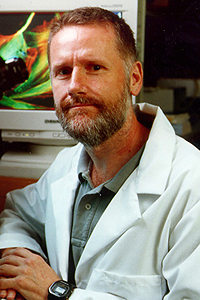 Graeme Bell 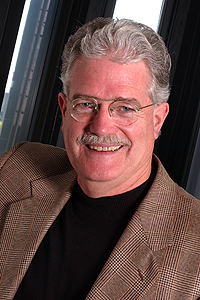 Bruce Cumings  Karl Freed 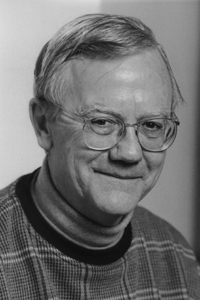 Michael Murrin | |
The leading authority on the genetics of type 2 diabetes, Graeme Bell, the Louis Block Professor in Medicine and Human Genetics, has been named the Louis Block Distinguished Service Professor.
Bell has been a leading molecular biologist and geneticist in studying the causes of diabetes, discovering gene mutations directly related to different forms of diabetes.
In 2000, he identified the major susceptibility gene for type 2 diabetes in Mexican Americans. The discovery—the first time a genome-wide approach had successfully led to identifying a susceptibility gene responsible for a common, genetically complex disorder—revealed an unexpected biochemical pathway leading to diabetes. This discovery suggested novel approaches to prevention, diagnosis and treatment of the disease.
A prolific researcher, Bell has published nearly 400 scientific articles and 75 book chapters and review articles. One of the co-founders of the biotech company Chiron, he holds 14 patents. The American Diabetes Association, the Juvenile Diabetes Foundation, the Swedish Medical Society and the British Diabetic Association have all honored Bell for his research, and in 1998 he was named to the Institute of Medicine of the National Academy of Sciences.
Born in Victoria, British Columbia, Bell received his B.Sc. in zoology and his M.Sc. in biology from the University of Calgary. He received a Ph.D. in biochemistry from the University of California, San Francisco in 1977, followed by a post-doctoral fellowship and then a faculty appointment in 1981, while also serving as a senior scientist at Chiron. In 1986, he joined the Chicago faculty.
Bruce Cumings, an internationally respected scholar of East Asian political economy and international history, has been named the Gustavus F. and Ann M. Swift Distinguished Service Professor in History and the College.
His research focuses on 20th-century international history, U.S.-East Asian relations, modern Korean history and American foreign relations. He is interested in the multiple ways in which conceptions, metaphors and discourses are related to the political economy and relationships between Eastern and Western powers.
He is the author of a number of books, including the two-volume set, The Origins of the Korean War (1981, 1990), War and Television (1993); Korea’s Place in the Sun: A Modern History (1997), Parallax Visions: American-East Asian Relationships at the End of the Century (1998), North Korea: Another Country (2003), and was co-author of Inventing the Axis of Evil (2004).
Cumings has recently finished a book entitled Dominion from Sea to Sea: Pacific Ascendancy and American Power.
In 1983, Cumings received the John. K. Fairbanks Prize given by the American Historical Association for the best book in modern East Asian history. He was recognized for The Origins of the Korean War.
Cumings received a B.A. in 1965 from Denison University and a Ph.D. in 1975 from Columbia University. Before joining the Chicago faculty, he served on the faculties of Swarthmore College and the University of Washington.
Karl Freed, whose research specialties include the study of polymer physics and theoretical and biophysical chemistry, has been appointed as the first Henry J. Gale Distinguished Service Professor in Chemistry and the College.
Freed’s research includes the statistical mechanics of polymers in the liquid phase, protein dynamics aggregation and folding, equilibrium aggregation phenomena, and molecular electronic structure. He and his team have developed a theory for the statistical thermodynamics of polymers in the liquid state. It is the first and only theory to describe the influence of monomer molecular structure on the thermodynamic properties of polymer mixtures.
Freed has held visiting positions at a variety of institutions, including the University of Manchester, England, as a NATO postdoctoral fellow, the Cavendish Laboratory in Cambridge, England, as a senior visiting fellow and IBM Research Labs in Almaden, Calif., where he served as a visiting scientist.
Among his honors, he has been a fellow of the Alfred P. Sloan Foundation, the John Simon Guggenheim Memorial Foundation and the American Physical Society.
He is a member of the Tau Beta Pi engineering honorary and the Phi Lambda Upsilon chemistry honorary. Freed also has received the Marlow Medal from the Chemical Society of London, the American Chemical Society Award in Pure Chemistry, and the Case Centennial Scholar Medal of Case Western Reserve University.
Freed received his B.S. from Columbia University in 1963. He then attended Harvard University, where he earned his A.M. in 1965 and his Ph.D. in 1967. He joined the Chicago faculty in 1968, and served as director of the James Franck Institute from 1983 to 1986.
Michael Murrin, the David B. and Clara E. Stern Professor in English Language & Literature, Comparative Literature, the Divinity School and the College, has been named the Raymond W. and Martha Hilpert Gruner Distinguished Service Professor.
Murrin’s research interests lie in two areas: the history of criticism, with a specialty in the history of allegorical interpretation, and the study of the genres of romance and epic. His teaching focuses on period courses in the late Middle Ages, the Renaissance and the early modern period.
The author of History and Warfare in the Renaissance Epic (1994), The Allegorical Epic (1980) and The Veil of Allegory (1969), Murrin is currently working on Romance and Asian Trade in Late Medieval and Early Modern Europe. His latest project intertwines themes of the growth of Europe’s middle-class culture and interest in aristocratic romance, as well as the simultaneous development of merchant trade across Asia, initially made possible by the Mongol world system. The book is a study of the imagination and attitudes that Murrin says affect thinking about Asia to this day.
After serving for two years as an instructor, Murrin joined the University faculty as an Assistant Professor in 1965. He has received two short-term fellowships for his research, one in 1996 from the Huntington Library, Art Collections, and Botanical Gardens, a collections-based research and educational institution, and another from the Folger Library in 1997. He was presented with a Guggenheim Foundation award in 1974, and he earned the University’s Llewellyn John and Harriet Manchester Quantrell Award for Excellence in Undergraduate Teaching in 1967.
Murrin earned his B.A. from the College of St. Thomas in St. Paul, Minn. and his M.A. and Ph.D. from Yale University.
Olufunmilayo Olopade, Professor in Medicine and Human Genetics, has been named the Walter L. Palmer Distinguished Service Professor in Medicine and Human Genetics.
Olopade, who grew up in Nigeria, has a special interest in understanding the genetic basis of cancer predisposition especially in women of African ancestry who are at higher risk for the more aggressive breast cancer and more likely to be diagnosed at a younger age. She recently showed that breast cancers in African women often produce a pattern of gene expression that is significantly different from that seen in Caucasians.
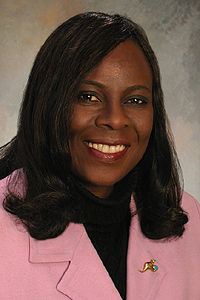 Olufunmilayo Olopade 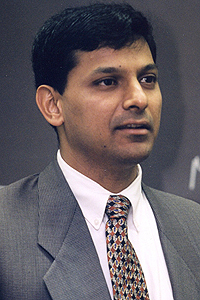 Raghuram Rajan 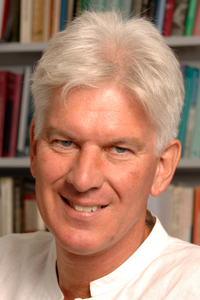 Edward Shaughnessy | |
As a clinician, her interests include finding and testing improved methods for prediction, prevention and early detection of cancer for moderate- and high-risk populations.She also is one of four principal investigators in a large-scale, multi-year, trans-disciplinary effort based at the University, to sort out the genetic and environmental factors that contribute to breast cancer.
Olopade is the recipient of a 2005 MacArthur Foundation fellowship; the 2003 “Phenomenal Woman Award” in recognition of her work within the African-American community; the Doris Duke Distinguished Clinical Scientist award in 2000; the American Society for Clinical Oncology Young Investigator award in 1991; and the University of Ibadan Sir Samuel Manuwa Gold Medal for Excellence in the Clinical Sciences in 1980, among others.
She received her M.D. in 1980 from the University of Ibadan, Nigeria, and served as a medical officer at the Nigerian Navy Hospital in Lagos. In 1986, she completed an internship and residency at the Cook County Hospital in Chicago. She trained in hematology and oncology as a postdoctoral fellow from 1987 to 1991 at the University and then joined the faculty in 1991.
Raghuram Rajan, the Joseph L. Gidwitz Professor of Finance in the Graduate School of Business, has been named the Eric J. Gleacher Distinguished Service Professor of Finance in the GSB.
Rajan’s research interests include international finance; banking; corporate finance; and theory of organizations, aid and economic growth.
Since 2003, Rajan has been the Economic Counselor and Director of Research at the International Monetary Fund and will return to teaching early next year. Rajan served as Director of the American Finance Association from 2001 to 2004, and he currently is program director of corporate finance at the National Bureau of Economic Research.
In 2003, the American Finance Association honored Rajan with the inaugural Fischer Black Prize for a person under 40 who has contributed the most to the theory and practice of finance. Rajan also received the Brattle Prize for a distinguished paper published in the Journal of Finance in 2000, 2001 and 2002.
In addition to his journal publications, Rajan is the co-author, with Luigi Zingales (the Robert C. McCormack Professor of Entrepreneurship and Finance in the GSB), of Saving Capitalism from the Capitalists (2003).
Rajan earned a B.Tech. in Electrical Engineering from the Indian Institute of Technology in 1985, an M.B.A. from the Indian Institute of Management in 1987, and a Ph.D. from the Massachusetts Institute of Technology in 1991.
Edward Shaughnessy, the Lorraine J. and Herrlee G. Creel Professor in East Asian Languages & Civilizations and the College, has been named the Lorraine J. and Herrlee G. Creel Distinguished Service Professor.
Shaughnessy is a renowned scholar of ancient China who studies China’s archaeologically recovered texts as well as the literary traditions in which they were born. In his own work Shaughnessy combines these areas of expertise, though when he teaches, he separates them, offering seminars on oracle-bone inscriptions, bronze inscriptions and bamboo-strip inscriptions, as well as classes on the Yi jing, Shi jing and Shang shu. His own personal interests lie heavily in bronze inscriptions and the Zhou Yi, both of which reached their full maturity toward the end of the Western Zhou period (1045 to 771 B.C.E.).
The author of eight books, Shaughnessy has published three titles in the past year: Ancient China: Life, Myth and Art, a popular overview of China to the mid-Tang; Gu Shi Yi Guan, a collection of his Chinese essays; and Rewriting Early Chinese Texts, an exploration of how editors have fashioned texts, especially those originally written on bamboo strips.
Shaughnessy came to the University in 1984. He earned his B.A. from the University of Notre Dame in theology; studied Chinese classics at Tiande Academy, Taipei, Taiwan, R.O.C.; studied language at the Kyoto Japanese Language Center; and earned both his M.A. and Ph.D. from Stanford University in Asian languages.
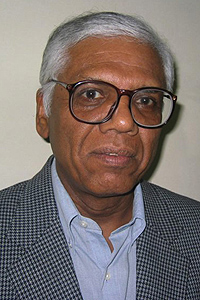 Muzaffar Alam 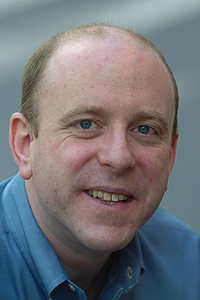 Phillip Berger 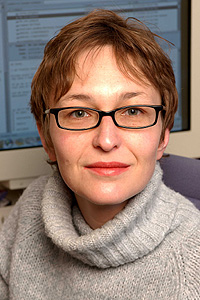 Marianne Bertrand | |
Muzaffar Alam, the Carl Darling Buck Professor in South Asian Languages & Civilizations and the College, has been named the George V. Bobrinskoy Professor.
Alam is an esteemed historian of India who specializes in Mughal political and institutional history and the history of Indo-Islamic culture. His current research includes the history of religious and literary cultures in pre-colonial northern India, the history of Indo-Persian travel accounts and the comparative history of the Islamic world as seen from the Indian perspective.
He is the author or editor of The Crisis of Empire in Mughal North India (1986); The Mughal State, 1526-1750 (1998); The Making of Indo-Persian Culture: Indian and French Studies (2000); A European Experience of the Mughal Orient (2001); The Languages of Political Islam in India, 1200-1800 (2004); and the forthcoming Indo-Persian Travels in the Age of Discovery, 1500-1800. Alam also has translated Persian materials from the later Mughal period and has worked closely with students on advanced Urdu and Persian literary and historical texts.
Alam came to the University in 2001 from Jawaharlal Nehru University in New Delhi, where he was professor and chair of the Center for Historical Studies in the School of Social Sciences. He earned his B.A. from Jamia Millia University, New Delhi, an M.A. and M.Phil. from Aligarh Muslim University, Aligarh, and a Ph.D. in history from the Jawaharlal Nehru University, New Delhi.
Philip Berger, Professor of Accounting in the Graduate School of Business, has been named the first Charles P. McQuaid Professor of Accounting in the GSB.
Berger’s research interests include: firm valuation; mergers, acquisitions and divestitures; the effects of accounting and tax regulations; the quality of accounting disclosures; organizational design; and corporate governance.
Berger currently serves as co-editor of the Journal of Accounting Research, and as a reviewer for numerous accounting, finance, and economics journals and conferences.
Berger’s recent publications include “Discussion of ‘Are Investors Misled by Pro Forma Earnings?’” published in Contemporary Accounting Research (Winter 2005) and “The Impact of SFAS No. 131 on Information and Monitoring” with Rebecca Hann in the Journal of Accounting Research (May 2003).
Prior to joining the GSB faculty in 2002, Berger was an associate professor of accounting at the University of Pennsylvania’s Wharton School. He also has taught at the Sloan School of Management at the Massachusetts Institute of Technology.
Berger earned a B.Comm. in 1984 and an M.Sc. in 1987 from the University of Saskatchewan. He earned an M.B.A. in 1988 and a Ph.D. in 1992 from Chicago.
Marianne Bertrand, Professor in Economics in the Graduate School of Business has been named the Fred G. Steingraber/A.T. Kearney Professor of Economics in the GSB.
Bertrand’s research interests include labor economics, corporate finance and development economics.
Among Bertrand’s forthcoming journal papers are: “The Role of Family in Family Firms” with Antoinette Schoar in the Journal of Economic Perspectives, “Behavioral Economics and Marketing in Aid of Decision Making Among the Poor” with Sendhil Mullainathan and Eldar Shafir in the Journal of Public Policy and Marketing, and “Banking Deregulation and Industry Structure: Evidence from the French Banking Reforms of 1985” with Antoinette Schoar and David Thesmar in The Journal of Finance.
Bertrand is the recipient of a 2005-2006 Florence Gould Foundation fellowship, the 2005 Elaine Bennett Research Prize, and grants from the Russell Sage Foundation and the National Science Foundation. She is currently an associate editor for the Economic Journal, The Quarterly Journal of Economics and Finance Letters. Prior to joining University faculty in 2000, Bertrand was an assistant professor of economics and public affairs at Princeton University.
She earned a B.A. in Economics from Université Libre de Bruxelles, Belgium, in 1991, an M.Sc. in Econometrics from Université Libre de Bruxelles in 1992, and a Ph.D. in Economics from Harvard University in 1998.
Mark Courtney, one of the nation’s leading scholars of welfare reform and child welfare services, has been named the first McCormick Tribune Professor in the School of Social Service Administration.
Since 2001, Courtney has been Director of the Chapin Hall Center for Children—a child and family policy research center at the University—and has recently returned to full-time teaching and research while remaining a faculty associate at Chapin Hall.
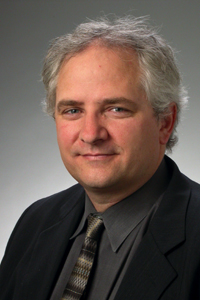 Mark Courtney 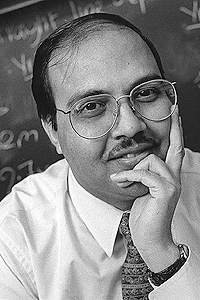 Sanjay Dhar 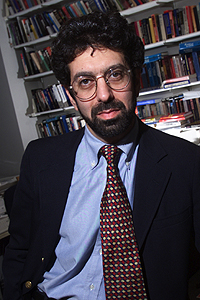 Charles Glaser | |
A common thread running through Courtney’s past and current work is a concern for the ways in which public institutions deliver social services at the community level. In an early path-breaking book, Unfaithful Angels: How Social Work has Abandoned its Mission, co-authored with Harry Specht, former dean of the University of California-Berkeley School of Social Welfare, Courtney urged social workers to return to the origins of the profession in the community and to refine their practice in that context. In more recent research, he has focused on the interaction of communities with child welfare work.
Using government administrative data, Courtney is currently tracking Chicago’s low-income population in their use of city and state social service, health and education systems with the goal of helping program managers better coordinate services. He also is involved in a longitudinal study of Milwaukee County families who applied for public assistance in 1999, as well as two studies of youths who are leaving the foster care system after reaching the age of majority.
Courtney received a B.A. in 1983 from the University of California, Berkeley, an M.A. in 1987 from John F. Kennedy University, an M.S.W. and a Ph.D. in 1992 from the University of California, Berkeley.
Sanjay Dhar, Professor of Marketing in the Graduate School of Business, has been named the James H. Lorie Professor of Marketing in the GSB.
Dhar’s research interests include advertising strategy, brand management, consumer promotion evaluation and planning, new products, retail management best practices and marketing strategy.
His scholarly papers include “The Role of Retail Competition and Account Retail Strategy as Drivers of Promotional Sensitivity” with Peter Boatwright and Peter Rossi, the Joseph T. and Bernice S. Lewis Professor of Marketing and Statistics in the GSB, and published in Quantitative Marketing and Economics (2004); “Asymmetric Store Positioning and Promotional Advertising Strategies: Theory and Evidence” with Surendra Rajiv and Shantanu Dutta in Marketing Science (2002); and “Effective Category Management Depends on the Role of the Category” with Stephen Hoch and Nanda Kumar in the Journal of Retailing (2001).
BusinessWeek’s Guide to Best Business Schools recognized Dhar 1997, 1999 and 2001 as an outstanding faculty member, and he received a 1994 Emory Williams Award for Excellence in Teaching as well as a 2000 McKinsey Award for Excellence in Teaching, both awarded by the GSB.
Dhar earned a B.Tech. in mechanical engineering from the Indian Institute of Technology in 1983, an M.B.A. from the Indian Institute of Management in 1987, and a Ph.D. in Management from the Anderson School of Management at the University of California, Los Angeles, in 1992.
Charles Glaser, who specializes in international security and defense policy, has been appointed as the first Emmett Dedmon Professor of Public Policy in the Irving B. Harris Graduate School of Public Policy Studies.
Glaser is studying recent changes in U.S. strategy that call for employing nuclear weapons in preemptive strikes against rogue-state nuclear forces, as well as against other weapons of mass destruction. His work also has maintained that international adversaries can sometimes best achieve their security goals through cooperative, rather than competitive, policies.
Much of Glaser’s early work focused on American Cold War nuclear weapons policy. He is the author of Analyzing Strategic Nuclear Strategy. He also has studied European security, focusing on how to transform security arrangements in Europe in response to the dissolution of the Warsaw Pact and the Soviet Union.
Glaser received his B.S. in physics, with Phi Beta Kappa and Sigma Xi honors, from the Massachusetts Institute of Technology in 1977. He received an A.M. in physics in 1980 and an A.M. in public policy in 1981, both from Harvard University. His Ph.D. in public policy, also from Harvard, followed in 1983.
He joined the Harris School faculty in 1991, where he has served as deputy dean since 1998. Glaser also was Acting Dean from 1994 to 1996.
Before joining the Chicago faculty, Glaser taught political science at the University of Michigan and served on the Joint Staff in the Pentagon. He also has been a fellow at the Center for International Security and Arms Control at Stanford University.
Jan Goldstein, an expert on the intellectual and cultural history of modern Europe, particularly France, has been named the Norman and Edna Freehling Professor in History and the College.
Goldstein, who joined the Chicago faculty as a beginning Assistant Professor in 1978, has focused much of her research on the history of the human sciences. She has been concerned with placing systems of knowledge in socio-political context, situating them in relation to the institutions that help generate and subsequently deploy them.
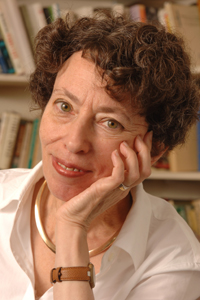 Jan Goldstein 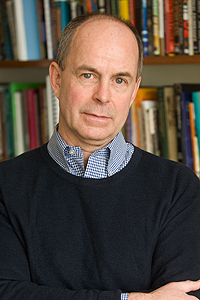 Reid Hastie 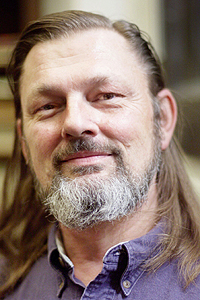 John Haugeland | |
In her latest book, The Post-Revolutionary Self: Politics and Psyche in France, 1750-1850 (2005), Goldstein examines “a literal politics of selfhood,” tracing the competition among theories used to develop the French state educational system. The book was awarded the David Pinkney Prize of the Society of French Historical Studies for the best French history book published in 2005.
She is present completing a book based on an archival discovery: a manuscript case history of “hysteria complicated by ecstasy” in a Savoyard peasant girl in the 1820s.
Goldstein also is the author of Foucault and the Writing of History (1994) and Console and Classify: The French Psychiatric Profession in the Nineteenth Century (1987), for which she received the Herbert Baxter Adams Prize for the best first book in modern European history. The American Historical Association presented her with this honor in 1989. An editor of the Journal of Modern History, Goldstein has received fellowships from the John Simon Guggenheim Memorial Foundation, The National Endowment for the Humanities, the National Science Foundation, as well as the Center for Advanced Study in the Behavioral Sciences and the National Humanities Center.
She received an A.B. in 1967 from Radcliffe College, and an M.A. in 1970 and a Ph.D. in 1978, both from Columbia University. Her undergraduate teaching at Chicago was honored by a Quantrell award in 1988.
Reid Hastie, Professor of Behavioral Science in the Graduate School of Business,has been named the Robert S. Hamada Professor of Behavioral Science in the GSB.
Hastie’s primary research interests are in the areas of judgment and decision making (managerial, legal, medical, engineering and personal), memory and cognition, and social psychology. His current research topics include the impact of rumors and news on stock market forecasts, the effects of background characteristics (such as race) on valuations of human life, and civil jury decision making.
He has served on review panels for the National Science Foundation, the National Institute of Mental Health, the National Research Council, and on 16 professional journal editorial boards.
Hastie has also published more than 100 articles in scientific journals. He is the co-author, with Robyn Dawes, of the textbook Rational Choice in an Uncertain World: The Psychology of Judgment and Decision Making.
Prior to joining the GSB faculty in 2001, he held faculty positions at Harvard University, Northwestern University and the University of Colorado, where he was Director of the Center for Research on Judgment and Policy.
Hastie earned a B.S. from Stanford University in 1968, an M.A. from the University of California, San Diego in 1970, and a Ph.D. from Yale University in 1973.
John Haugeland, Chairman and Professor in Philosophy, Conceptual Historical Studies in Science and the College, has been named the David B. and Clara E. Stern Professor.
Haugeland research focuses on early Heidegger, philosophy of science, philosophy of mind, cognitive science and philosophy of language.
He is the author of Artificial Intelligence: The Very Idea (1985), a book which has since been translated and published in German, Portuguese, Spanish, French and Greek; the editor of Mind Design (1981) and Mind Design II (1997); and co-editor of a volume of Thomas Kuhn’s essays, The Road Since Structure: Philosophical Essays, 1970-1993 (2000). He is currently working on a book tentatively titled Heidegger Disclosed.
Haugeland has been a fellow at the Center for Advanced Studies in the Behavioral Scineces, a National Endowment for the Humanities fellow, a 2003-2004 John Simon Guggenheim Foundation fellow and has served on the board of directors of the University’s Franke Institute for the Humanities from 2000 to 2002.
Haugeland came to the University in 1999 from the University of Pittsburgh. He earned his B.S. in Physics from Harvey Mudd College and his Ph.D. in Philosophy from the University of California, Berkeley.
John Heaton, James H. Lorie Professor of Finance in the Graduate School of Business, has been named the Joseph L. Gidwitz Professor of Finance.
Heaton’s research interests include asset pricing, portfolio allocation and time-series econometrics.
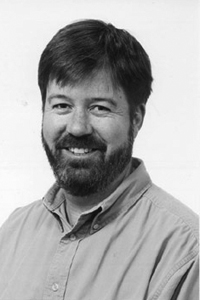 John Heaton 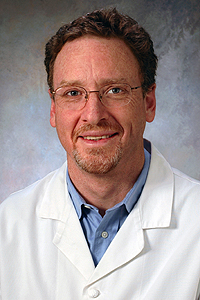 Terrance Peabody 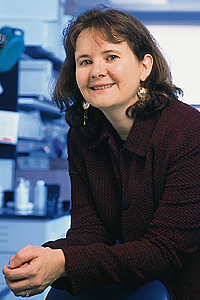 Daphne Preuss | |
Heaton’s publications include “Portfolio Choice in the Presence of Background Risk” with Deborah Lucas in Economic Journal (January 2000) and “Portfolio Choice and Asset Prices: The Importance of Entrepreneurial Risk” with Lucas in the Journal of Finance (June 2000). His book chapter “Can Heterogeneity, Undiversified Risk, and Trading Frictions Solve the Equity Premium Puzzle?” is forthcoming in the Handbook of Investments: Equity Risk Premium, edited by Rajnish Mehra.
Heaton is associate editor of the American Economic Review. He is currently a research associate with the National Bureau of Economic Research and is the recipient of fellowships from the Hoover Institution and the National Science Foundation, among others.
Prior to joining the faculty in 2000, Heaton taught at Northwestern University’s Kellogg Graduate School of Management and at the Sloan School of Management at Massachusetts Institute of Technology.
Heaton earned a B.Comm. from the University of Windsor in 1982, an M.A. in Economics from the University of Western Ontario in 1984, and a Ph.D. in Economics from Chicago in 1989.
Terrance Peabody, an orthopaedic surgeon and Professor in Surgery, has been appointed the first Simon and Kalt Families Professor in Surgery.
Peabody is an authority on limb salvage surgery and functional restoration for individuals afflicted with bone and soft tissue tumors, metastatic disease or the consequences of severe trauma or infection.
He also is the author or co-author of more than 30 peer-reviewed journal articles and 20 book chapters of review articles, all focused on the surgical treatment of bone and soft-tissue tumors.
Peabody is a member of the American Academy of Orthopaedic Surgery, the American Orthopaedic Association and is President-elect for Musculoskeletal Tumor Society. He also is a consultant reviewer for multiple orthopaedic publications and has served as a guest editor for the Orthopaedic Clinics of North America. He is a member of the Board of Consulting Editors for research for the Journal of Bone and Joint Surgery. He is also the Program Director for the Orthopaedic Surgery Residency Program and Orthopaedic Oncology Fellowship Program at the University.
After a fellowship in orthopaedic oncology at Chicago, he joined the surgical faculty at the University of California, Irvine in 1991. He was recruited back to Chicago in 1994 and promoted to Associate Professor in 1999, Professor in 2005, and Interim Section Chief of Orthopaedic Surgery and Rehabilitation Medicine in 2006.
Born in Orange, Calif., Peabody was educated at the University of California, Irvine. He graduated magna cum laude with a B.S. in 1981, won the senior humanitarian award and the Hatfield Surgery Award when he received his M.D. in 1985, and completed his residency on orthopaedic surgery in 1990.
Daphne Preuss has been named the Albert D. Lasker Professor in
Molecular Genetics & Cell Biology. Preuss studies
the genetics of reproduction in Arabidopsis thaliana, a self-pollinating flowering plant that serves as the “fruit
fly” of the plant kingdom for its ease of laboratory growth and genetic
manipulation.
Preuss and her laboratory
team are working to understand how organisms control passing on correct genetic
material to their offspring. Preuss has identified two key protein families for
genetic control that are on the surface of Arabidopsis pollen and has used them
to study the pollen allergy that affects nearly 20 percent of the U.S.
population.
Preuss also has
used pollen tubes to reveal important roles for gamma-amino butyric acid, or
GABA, a common neurotransmitter. In addition, she is interested in the genetics
behind rapid evolution and has developed artificial chromosomes in plants.
Currently she is using an in vitro assay to examine the way GABA and other small
molecules signal.
Research papers by
Preuss have recently appeared in Cell, Genetics and Nature Methods. She also is a
Packard Fellow, a Searle Scholar and an investigator for the Howard Hughes
Medical Institute.
Before
coming to Chicago, Preuss was a post-doctoral researcher at Stanford
University, where she received fellowships from the National Science Foundation
and the American Cancer Society. She earned two B.S. degrees, both summa cum
laude, in 1985 from the University of Denver: one in chemistry and one in
natural sciences. She earned a Ph.D. in biology from the Massachusetts
Institute of Technology in 1990.
Melissa Roderick, a prominent scholar of education and Co-director
of the Consortium on Chicago School Research, has been named the Hermon Dunlap
Smith Professor in the School of Social Service Administration.
Roderick’s expertise is in
urban school reform, high-stakes testing, minority adolescent development and
school transitions. She also is the faculty director of SSA’s Community Schools
program.
Her work has focused
attention on the transition to high school as a critical point in students’
school careers, and on the transition to college among Chicago Public Schools
students. Roderick’s latest work is a joint project between CPS and the
consortium, focusing on the relationship between students’ high school careers
and preparation, their college-selection decisions, and their post-secondary
outcomes.
In the first report from
this study, Roderick announced findings showing that grades are a more
important predictor of college enrollment and graduation than are entrance exam
scores for graduates of Chicago Public Schools. The study also found
substantial differences across colleges in graduation rates among highly
qualified CPS graduates, suggesting that college selection matters a great
deal.
Roderick also is in the
midst of a longitudinal study tracking 105 CPS students who graduated high
school this year. The study, which will track these students for two years,
also will follow students who did not attend college.
From 2001 to 2003,
Roderick served the CPS administration as founding director of the Department
of Planning and Development.
Roderick received an A.B.
in 1983 from Bowdoin College and an M.P.P. in 1986 from Harvard University’s
John F. Kennedy School of Government. She received her Ph.D. in 1991 from the
Committee on Public Policy, Harvard University, and joined the Chicago faculty
that same year.
Lainie Friedman
Ross, Professor in Pediatrics and Associate Director of
the MacLean Center for Clinical Medical Ethics, has been named the first Carolyn and Matthew
Bucksbaum Professor. She was also recently appointed the Chief of the Section of Community Health Sciences in the Institute for Molecular Pediatric Sciences.
Ross is a leader in the field of pediatric ethics and has been on the Chicago faculty since 1994. Ross is a fellow of the American Academy of Pediatrics where she serves on the Executive Committee of the Section on Bioethics, the Committee on Bioethics, and is the ethics consultant to the Pediatric Research in Office Settings (PROS) network. She also is a member of the Ethics Committee for the United Network of Organ Sharing (UNOS) and has served on numerous data safety monitoring boards for the National Institutes of Health.
In addition to publishing more than 60 original peer-reviewed articles in major medical, philosophical and legal journals, Ross has written two single-authored books: Children, Families and Health Care Decision Making (Oxford University Press, 1998) and Children in Medical Research: Access Versus Protection (Oxford University Press, 2006). She is on the editorial boards of Theoretical Medicine and Bioethics, the Journal of Clinical Ethics, and Perspectives in Biology and Medicine.
Ross received her A.B. in 1982 from the Woodrow Wilson School of Public and International Affairs at Princeton University and then an M.D. from the University of Pennsylvania in 1986. She earned an M.Phil. from Yale University in 1992 and a Ph.D. in philosophy from Yale University in 1996.
Tina Rzepnicki, a distinguished scholar of social work practice,
has been named the first David and Mary Winton Green Professor in the School of
Social Service Administration. She is also director of the Center for Social
Work Practice and principal investigator of the Program Practices Investigation
Project with the Office of Inspector General of the Illinois Department of
Children and Family Services.
Rzepnicki is currently
evaluating the impact of task-centered intervention training delivered to more
than 60 employees of the Teen Parent Services Network, which covers the greater
Chicago area. Collaborating with colleagues from the University of Minnesota,
the evaluation will measure changes in job performance of direct service staff
and their supervisors.
In addition, she recently
piloted the application of root-cause analysis to decision- making errors in
human services, particularly errors that result in severe injury or death of a
child. This method was originally developed to examine the contributions of
individual behavior, administrative practices, policies and contextual factors
to catastrophic outcomes in such high-risk situations as airline crashes and
nuclear accidents.
Widely published in the
area of child-welfare and social-work clinical practice, Rzepnicki has
co-authored four books; most recently she co-edited, with Harold Briggs, the
volume Using Evidence for Social Work Practice: Behavioral Perspectives, which also includes several chapters she wrote.
Rzepnicki received an A.B.
in 1973 from DePauw University, and an A.M, in 1978 and a Ph.D. in 1982 from
SSA. She served on the faculty of Fordham University before joining the SSA
faculty in 1987.
Neil Shubin, Associate Dean of Organismal Biology & Anatomy
and Evolutionary Biology, and Provost of the Field Museum, has been named the
Robert R. Bensley Professor of Organismal Biology & Anatomy.
Shubin researches the
evolutionary origin of anatomical features of animals. He has conducted field
work in Greenland, China, Canada, much of North America and Africa, and he has
published multiple articles in the Journal of Vertebrate Paleontology and Paleobiology, as well as more than 18 articles in Science and Nature.
Shubin’s most recent
discovery, Tiktaalik roseae, has been
dubbed the “missing link” between fish and land animals. His two papers on Tiktaalik
roseae, which appeared in Nature April 6, prompted ABC News to name Shubin “Person
of the Week.”
Shubin also has done
important work on the developmental biology of limbs. The evolution of limbs is
Shubin’s specific area of expertise. He uses his diverse fossil findings to
devise hypotheses on how anatomical transformations occurred by way of genetic
and morphogenetic processes.
A John Simon Guggenheim Memorial Foundation fellow,
Shubin earned a Ph.D. in organismic and evolutionary biology from Harvard
University in 1987 and joined the University faculty as Chairman of Organismal
Biology & Anatomy in 2001.
Douglas Skinner, Professor of Accounting and a Neubauer Family
Faculty Fellow in the Graduate School of Business, has been named the John P.
and Lillian A. Gould Professor of Accounting.
Skinner’s research
interests include corporate financial reporting and disclosure practice as well
as corporate payout policy.
Skinner is currently
co-editor of the Journal of Accounting Research.In 2004, he was awarded
the Jensen Prize for the best paper in Corporate Finance and Organizations
published in the Journal of Financial Economics.
Skinner’s journal
publications include “Are Dividends Disappearing? Dividend Concentration and
the Consolidation of Earnings” with Harry DeAngelo and Linda DeAngela in the Journal
of Financial Economics (June 2004),
“Employee Stock Options, EPS Dilution, and Stock Repurchases” with Daniel Bens,
Venky Nagar and M.H. Franco Wong in the Journal of Accounting and
Economics (December 2003), and “The Role of
Supplementary Statements with Management Earnings Forecasts” with Amy Hutton
and Gregory Miller in the Journal of Accounting Research (December 2003).
Prior to joining the
Chicago faculty, Skinner was the KPMG Professor of Accounting at the University
of Michigan Business School, where he taught from 1989 to 2005.
Skinner earned a B.Ec. in
Accounting from Macquarie University, Sydney, Australia in 1985, an M.S. in
Applied Economics from the University of Rochester in 1988, and a Ph.D. in
Accounting from the University of Rochester in 1989.
Froma Walsh, a leading mental health scholar on family
resilience and strengths-oriented, community-based family therapy is the first
Mose and Sylvia Firestone Professor of Clinical Social Work in the School of
Social Service Administration. Walsh also has an appointment in Psychiatry and
is co-director of the Chicago Center for Family Health.
Walsh’s scholarly work led
her to develop a research-informed, family resilience framework for
interventions to strengthen families facing crisis, trauma or loss; disruptive
transitions; and prolonged adversity. Her model is used in research, program
development and direct practice in many parts of the world. Her most recent
work addresses family and community resilience in response to widespread trauma
and catastrophic events, including natural disasters such as Hurricane Katrina,
war-related losses, refugee experiences and terrorist attacks.
At the invitation of the
United Nations Relief and Work Agency, Walsh traveled to Jerusalem this past
summer to provide training for community mental health workers who are serving
Palestinian refugee children and families suffering severe trauma and loss.
Her books include Strengthening
Family Resilience, Normal Family
Processes: Growing Diversity and Complexity,
Living Beyond Loss: Death in the Family, Spiritual Resources in Family Therapy and Women in Families.
Walsh has received many
honors for her distinguished contributions to theory, research and practice,
including awards from the American Psychological Association’s Division of
Family Psychology, the American Association for Marriage and the Family, and
the American Family Therapy Academy (of which she is a past president).
She received a B.A. in
1964 from the University of California, Berkeley, an M.S.W. in 1970 from Smith
College, and a Ph.D. in Human Development in 1977 from Chicago. She joined the SSA faculty in 1982.
Kevin White, a pioneer in combining experimental and
computational techniques to understand the networks of factors that control
gene expression during development and evolution, has been named the first
James and Karen Frank Family Professor.
White, who began his appointment Friday,
Sept. 1, came to Chicago from the Yale University School of Medicine as
Professor in Human Genetics and Ecology & Evolution. White also is Director
of the new Institute for Genomic & Systems Biology at the University and
Argonne National Laboratory.
He studies how networks of genes and
proteins control development and disease and how they produce differences
between individuals or between species.
Using the knowledge gained from the genome-scale approaches he employs,
he focuses on biomarker and therapeutic discovery for complex diseases such as
cancer. At Argonne, his institute will develop new technologies for genome
analysis, and new investigators under his direction will also focus on
engineering organisms that are critical for biofuel production Ð in addition to
large scale analysis of model organisms and the human genome
In 2000, he joined the Yale University
faculty as an assistant professor of genetics. He was named a National Institutes of Health Genome Scholar
in 2000, a W.M. Keck Distinguished Young Investigator in Medical Sciences in
2003, and an Arnold and Mabel Beckman Young Investigator in 2004.
White graduated magna cum laude from Yale with a joint B.S./M.S. in Biology in
1993.He completed his Ph.D. in
Developmental Biology at Stanford University in 1998, followed by a
postdoctoral fellowship in biochemistry and genomics at the Stanford Genome
Technology Center.
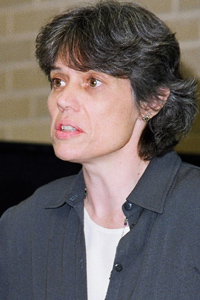
Melissa Roderick
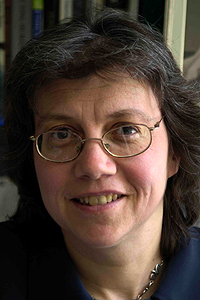
Lainie Friedman Ross
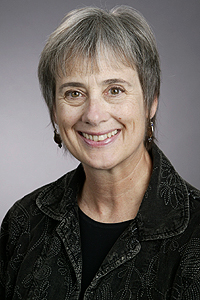
Tina Rzepnicki
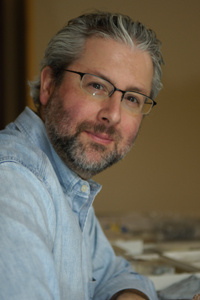
Neil Shubin
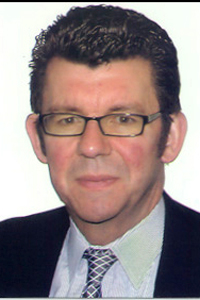
Douglas Skinner

Froma Walsh
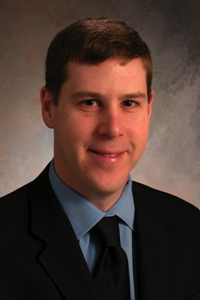
Kevin White
![[Chronicle]](/images/sidebar_header_oct06.gif)